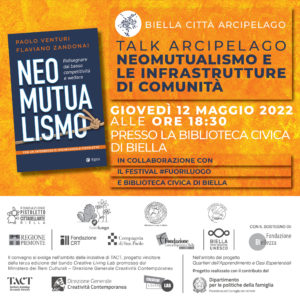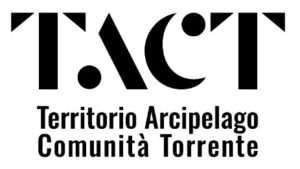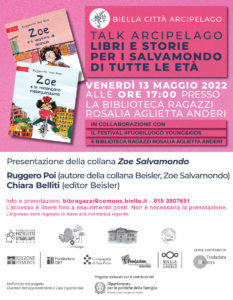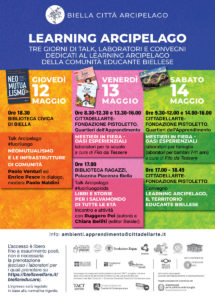The project Biella Città Arcipelago continues: in the wake of Biella’s designation as UNESCO Creative City, last April Cittadellarte launched the Archipelago Talks, a series of public meetings inviting Biella’s citizens to participate and discuss with experts and writers on urgent issues such as water, education and food in order to steer the Biellese territory towards sustainable prosperity. Each meeting is organised in a different place in the city and is supported by the collaboration of important local players such as ASL Biella, #fuoriluogo, Biella’s Civic Library, the social consortium il Filo da Tessere, Candelo’s Pro Loco, Slow Food, Let Eat Bi, Bio Rice District. The first appointment, Public meeting for a Biella observatory on water, took place at Cittadellarte in the space of the exhibition Biella Città Arcipelago and dealt with the theme of water as a common good (all the details in a previous article). Next in the programme, from 12 to 14 May, is Learning Archipelago, three days of talks, workshops and conferences dedicated to the educating community operating in the Biella area.

The presentation of the book ‘Neo-mutualism. Redesigning competitiveness and welfare from below’.
The second Archipelago Talk will start at 18.30 on 12 May at Biella’s Civic Library, organised in collaboration with the #fuoriluogo festival, and will focus on neo-mutualism and community infrastructures: for the occasion, Paolo Venturi will talk with the director of the social consortium Il Filo da Tessere Enrico Pesce, with Paolo Naldini, director of Cittadellarte, acting as moderator. “In a society that multiplies connections but weakens ties,” reads the book’s presentation, “it is necessary to identify new forms of integration capable of generating value and meaning, in ways that are open to the contribution of different actors. The urgency, already perceived by the most attentive observers, has become apparent to everyone in these stormy years, in which the experience of a common evil has made it clear what that common good actually is, which is not – as some would have us believe – merely an illusion, and how this depends on the convergence and responsibility of all. Faced with the concrete demand of new needs, Paolo Venturi and Flaviano Zandonai introduce a new – radical – level of analysis and action with their book ‘Neo-mutualism. Redesigning competitiveness and welfare from below’, published by Egea”. The authors focus on what could prove to be a third response to the two poles of market transactions and public redistribution. “Regenerated by the current crises,” specifies the dedicated press note, “mutualism may in fact represent the key to recombine the traditional forms of creation of value in the sign of relations of actual reciprocity and a deeply cooperative form of exchange, able to keep the community at the centre”. Moreover, with a view to reinforcing the hope that culture represents the ideal laboratory for experimenting with new economies and generative processes for society, the book features an interlude by Michelangelo Pistoletto. “Dry pages,” the presentation adds, “but full of meaning, in which the artist reflects on trinamics, through which different elements such as public and private, natural and artificial, local and global, combine to give rise to new life”. The event is part of the initiatives of TACT, the winning project of the public call Creative Living Lab – 3rd edition, promoted by the General Directorate for Contemporary Creativity of the Ministry of Culture.


Presentation of the books in the Zoe Salvamondo series
On Friday 13 May at 17.00, this time in collaboration with #fuoriluogokids, Ruggero Poi (author of the series Zoe Salvamondo, published by Beisler) will talk to Chiara Belliti about “books and stories for ‘salvamondo’ children of all ages”, which deal with the themes of environmental sustainability by arousing curiosity and the desire to get involved through the amusing and accessible stories of two new narrative books for children – Zoe e la melanzana melanzanissima and Zoe e il vestito di arancia – which feature Zoe Salvamondo as the protagonist. Zoe is a curious recurring character in the illustrated stories published by Beisler embodying an awareness-raising project based on Michelangelo Pistoletto‘s idea of the Third Paradise and on the artistic experience of Cittadellarte-Fondazione Pistoletto, also inspired by and referring to the 17 United Nations Sustainable Development Goals. “Zoe’s stories,” say the authors, “tell of an independent childhood, free to experiment and pursue her own ideas, with awareness, confidence and a desire to learn new things”. The fresh and direct writing of Ruggero Poi, director of Cittadellarte’s Learning Environments Office, is accompanied by the lively drawings of Alice Rossi, an emerging illustrator engaging with the themes of change and collective responsibility through art; two brilliant minds who care about education and practice sustainability on a daily basis, teaching children, holding art therapy workshops, and taking part in projects of social responsibility. Click here to view our previous interview with Ruggero Poi about his series.

The three-day event and the EduCare call for proposals
The project supported by the EduCare call of the Department for Family Policies entitled “Quartieri dell’Apprendimento e Oasi Esperienziali” (‘Learning quarters and experiential oases’, developed by Cittadellarte, the social consortium Il Filo da Tessere, the association Better Places, with the support of Fondazione Zegna) is an opportunity to continue to think about educational issues in the territory thanks to a three-day event organised in Biella on 12, 13 and 14 May 2022. Even before the epidemic broke out, a number of working groups were set up in the Biella area, which, by imagining the area’s green and natural environment as an open-air classroom, involved a growing number of community players: schools, parents, third-sector organisations, the world of research and business, in order to come up with proposals that were both alternative and complementary to those traditionally carried out in schools. In the following years of work, important and diversified actions have thus been implemented, concerning methodological-educational innovations towards sustainability of all resources (including human resources), continuous learning projects, creation of outdoor education spaces, early orientation activities, family support services, direct knowledge of Biella organisations active in education, and the exchange of good practices between teachers and educators and local actors. In an increasingly broader and more intentional way, there has been a response to the urgent need to facilitate the organisations part of the educational systems in implementing those innovations necessary to make communities cohesive, resilient and aware. The idea of an ‘educating community‘, which has entered the national domain, has thus been explored locally by identifying organisations considered to be crucial in order to include them into a system without distorting their specific vocation. On these premises, on 14 May, at the end of the three-day event, the conference Learning Archipelago, the Educating Territory of Biella, scheduled from 17.00 in the spaces of Fondazione Pistoletto will offer a moment of dialogue aiming at promoting actions of increasingly aware and effective territorial co-design. The appointment will be divided in three distinct but interconnected parts. After the greetings and the presentation of the call, the protagonists will tell about the EduCare experience: Filo da Tessere will introduce the Experiential Oases, Better Places the Multimedia Creativity District and Cittadellarte the Learning Districts. Spaces and Times for a Learning Archipelago will then see Ruggero Poi discuss the Learning Archipelago with the participation of Anna Zegna and Cristina Grosso (Outer Educampus Oasi Zegna), Giuseppe Pidello and Nazarena Lanza (Scuola senza pareti – School without walls – la Trappa di Sordevolo), Roberta Bacchi and Enrico Pesce (Cascina Oremo – Biella). To conclude the day will be Guardare oltre (Looking beyond), organised by the Provincial School Office and Fondazione CRB, followed by an aperitif. Friday’s and Saturday’s programmes will also include, from 8.30 to 12.30 and from 13.30 to 16.00, Mestieri in Fiera, a series of workshops for schools organised by Filo da Tessere, which will be held in Cittadellarte’s Learning Quarters.

Biella Creative City and the Learning Archipelago model
The opportunity to create a ‘nova civitas‘ on a territorial scale presented itself with the UNESCO designation of Biella Città Creativa, represented by the Third Paradise. “The symbol not only highlights the correspondence between the City of Biella and Cittadellarte,” explain the organisers of the three-day event, “but extends it to all the municipalities in the province of Biella that have signed up to the candidacy. Biella Creative City is an opportunity to invest in the future of this territory by putting into practice a new concept of community organisation, which Michelangelo Pistoletto has called ‘archipelago city’”. With this in mind, it is proposed that the Biella educating community table adhere to the systemic territorial vision called ‘Biella Archipelago City’. This vision, promoted by the Biellese artist and Cittadellarte, is therefore followed by the Learning Archipelago model, “identifying with this name a vision that can be shared by the various territorial actors (schools, third-sector organisations, profit-making companies, municipalities…) by jointly implementing a conscious complementarity of educational actions aimed first of all at the new generations and subsequently at all the inhabitants of the Biella area. We believe,” they conclude, “that cultural regeneration today cannot be separated from a reorganisation of the education and training system, creating a network including public and private entities”.

